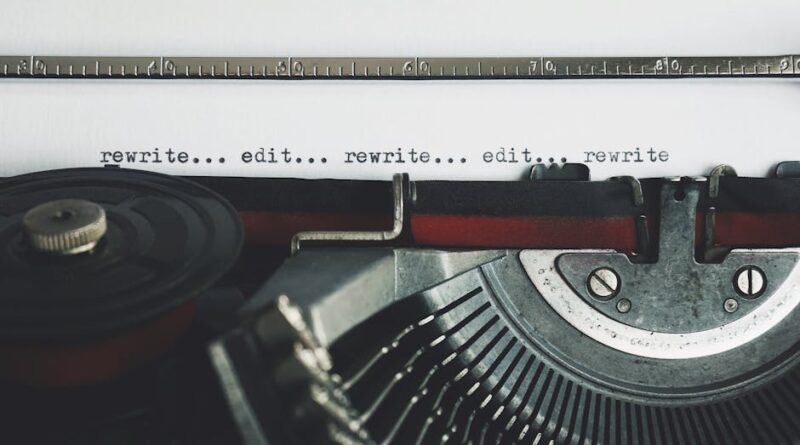Editing Tips for Self-Published Authors
Did you know that about 80% of self-published books fail to sell more than 100 copies? One major reason is poor editing. Quality editing can make or break your book’s success. So, how do you ensure your manuscript shines? Here are some essential editing tips that every self-published author should know.
What is Editing and Why is it Important?

Editing is not just fixing typos. It’s a process that improves your writing, making it clearer and more engaging. Think of editing as polishing a diamond; it brings out the best in your work. A well-edited book helps readers connect with your story and encourages them to recommend it to others.
What Are the Different Types of Editing?

There are several types of editing you’ll encounter. Each serves a unique purpose:
- Developmental Editing: This looks at the big picture. It involves story structure, character development, and pacing.
- Line Editing: This focuses on the flow of your writing. It looks at word choice, sentence structure, and style.
- Copy Editing: This is where you check for grammar, punctuation, and spelling mistakes.
- Proofreading: This is the final step. It catches any last-minute errors before publication.
Each type is essential for creating a polished final product. Think of it like layers of an onion; each layer adds depth and quality.
How Do You Start the Editing Process?

First, take a break. After finishing your draft, set it aside for a week or two. This will help you read it with fresh eyes. When you return, youll spot mistakes you missed before.
Next, consider your editing environment. Find a quiet space where you can focus. Remove distractions like your phone or social media. This clarity will help you catch errors more effectively.
Should You Edit Alone or Hire an Editor?

Many authors wonder if they should go solo or hire a professional editor. Here are some points to consider:
- Editing Alone: This can save money, but it’s tough to spot your own mistakes. You might miss plot holes or awkward phrasing.
- Hiring an Editor: A professional can provide a fresh perspective. They often see issues that you might overlook.
Think about your budget and your confidence in your editing skills. Sometimes, a mix of both works well. You can do an initial edit and then hire a pro for a second pass.
What Are Some Practical Editing Tips?
Ready to dive into editing? Here are some practical tips you can use:
- Read Aloud: This helps you catch awkward phrases and rhythm issues. Your ears often catch mistakes your eyes miss.
- Use Editing Software: Tools like Grammarly or ProWritingAid can help identify mistakes.
- Focus on One Thing at a Time: Tackle grammar in one read-through, then check for plot consistency in another.
- Get Feedback: Share your work with beta readers. They can spot confusing parts and provide valuable input.
Each of these tips can help sharpen your manuscript and prepare it for publication.
What Common Mistakes Should You Avoid?
As you edit, be mindful of these common pitfalls:
- Overuse of Adjectives: Instead of saying very big, choose a stronger word like huge. This makes your writing tighter.
- Long Sentences: Short sentences can create impact. Vary your sentence lengths for a better rhythm.
- Ignoring Consistency: Check your character names, timelines, and settings. Inconsistencies can confuse readers.
Avoiding these mistakes can significantly enhance your writing quality.
When Should You Stop Editing?
Editing can feel endless. So, how do you know when you’re done? Set specific goals. For example, decide how many rounds of edits youll do. Once you hit your goal, it might be time to move on.
Also, listen to your beta readers. If they’re satisfied with your book, it’s a good sign you’re ready for publication. Trust their feedback, but also trust your instincts.
How Important is a Professional Proofreader?
A professional proofreader is crucial. They focus solely on finding errors. After spending so much time on your book, it’s easy to overlook mistakes. Proofreaders have that unique perspective.
They can spot:
- Typos
- Missing words
- Formatting issues
Even the best authors use proofreaders. it’s a small investment for a polished and professional final product.
How Can You Make the Most of Feedback?
Once you share your manuscript, be open to feedback. It can feel personal, but remember, it’s meant to help you grow. Here are some tips for handling feedback:
- Stay Objective: Focus on the suggestions rather than the delivery.
- Ask Questions: If something isn’t clear, ask for clarification.
- Take Notes: Jot down important points for later consideration.
Feedback can be a goldmine for improvement. Use it wisely to refine your work.
What Final Checks Should You Do Before Publishing?
Before hitting that publish button, conduct a final check. This can include:
- Double-Checking Formatting: Ensure your chapters are properly formatted for eBook or print.
- Reviewing the Cover: Make sure your cover design aligns with your content and genre.
- Final Proofread: Always do one last read-through to catch any lingering errors.
These steps can give your book a strong finish and make it appealing to readers.
Where Can You Learn More About Editing?
Editing can be a complex journey, but many resources are available. Websites like Editorial Reviews provide valuable insights. You can find articles, tips, and even courses to help improve your editing skills.
Additionally, consider joining writing groups or forums. Connect with fellow authors who can share experiences and tips.
What Are Your Actionable Takeaways?
Editing is a crucial step in self-publishing. Here are some key takeaways:
- Understand the different types of editing.
- Take breaks to gain perspective.
- Be open to feedback and hire professionals if possible.
- Stay mindful of common mistakes.
With these tips, you can enhance your manuscript and prepare it for the spotlight. Remember, a well-edited book is more likely to resonate with readers and find success.
Happy editing!



